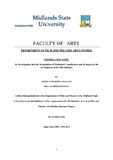Please use this identifier to cite or link to this item:
https://cris.library.msu.ac.zw//handle/11408/2123Full metadata record
| DC Field | Value | Language |
|---|---|---|
| dc.contributor.author | Mazano, Simon Tafadzwa | - |
| dc.date.accessioned | 2017-06-22T10:37:17Z | - |
| dc.date.available | 2017-06-22T10:37:17Z | - |
| dc.date.issued | 2016-11 | - |
| dc.identifier.uri | http://hdl.handle.net/11408/2123 | - |
| dc.description.abstract | The study is an investigation into the deregulation of Zimbabwe’s media laws and its impact to the development of the film industry. Investigating on a deregulated media industry allows the study to reveal how the current media laws are suppressive and restrictive to film making activities in the country. Thus, the study critically explains how laws like the Censorship and Entertainments Act, Access to Information and Protection of Privacy Act, Broadcasting and Service Act and Public Order and Security Act pose challenges to directors, script writers, actors, distributors and produce within the film industry, which has caused under development in Zimbabwe’s film industry. The study thus gives reference to countries that have deregulated media industries and how the deregulation has helped the growth of film making in those countries. The investigation is largely guided by theories that focus on the Watch dog role of media and the Audience reception theory.The data presented in the study was obtained through Qualitative and Quantitative research methods in form of interviews, questionnaires, focus groups and internet blogs and document archives. Results brought forward by the research were critically analysed and presented that most people in film making and media favour a deregulated industry. This was driven by the distaste they had for the current media laws as they have suppressed means to which they earn a living from. The study also found out that the laws are unconstitutional and save less to a democratic nation, this gives emphasises to why they should be deregulated. In light of all this, the study concluded that deregulating the current media laws will give life to Zimbabwe’s film industry whilst contributing largely to the nation’s economy. Recommendations that include consulting film practitioners, deregulating the laws as way of creating employment and saving democratic principles were posed to the government. | en_US |
| dc.language.iso | en | en_US |
| dc.publisher | Midlands State University | en_US |
| dc.subject | Deregulation, Zimbabwe | en_US |
| dc.subject | Media laws | en_US |
| dc.title | An Investigation into the deregulation of Zimbabwe’s media laws and its impact to the development of the film industry | en_US |
| item.fulltext | With Fulltext | - |
| item.languageiso639-1 | en | - |
| item.grantfulltext | open | - |
| Appears in Collections: | Bachelor Of Arts In Film And Theatre Arts Studies Honours Degree | |
Files in This Item:
| File | Description | Size | Format | |
|---|---|---|---|---|
| final%20draft#.pdf | Full Text | 971.81 kB | Adobe PDF |  View/Open |
Page view(s)
44
checked on Jul 26, 2024
Download(s)
26
checked on Jul 26, 2024
Google ScholarTM
Check
Items in MSUIR are protected by copyright, with all rights reserved, unless otherwise indicated.


